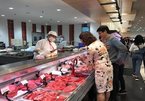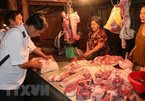 |
|
A consumer buys meat at a Hapro supermarket in Hanoi.
\ |
Cuong was speaking after spending the day inspecting cattle, poultry and pig herds in Bac Giang province to check there were enough supplies for before and after the Tet (Lunar New Year) holiday.
He said inflated pork prices would drive consumers away from local pork to other meats or imported products, causing problems for the domestic pork market.
There were also too many intermediaries involved in the distribution of pork products, adding to the higher prices, Cuong said.
State agencies as well as production and distribution firms should try to reduce the number of intermediaries between production and distribution to benefit both producers and consumers, he added.
On December 19, the Ministry of Agriculture and Rural Development (MARD) instructed Vietnamese livestock enterprises to focus on rebuilding their herds following the outbreak of African swine fever and ask them to desist from smuggling to Chinese market to enjoy higher prices.
The MARD has asked the Ministry of Finance to direct localities to provide more funding for the farmers' recovery.
It has also asked the State Bank of Vietnam to direct local banks to make it easier for businesses and farmers to access loans for expansion, recovery of livestock production and processing.
To strictly control the pork market, the Ministry of Industry and Trade (MoIT) will set up inspection teams with the General Department of Market Management, and police and veterinary departments to control the market and stop the consumption of pork without origin.
At the same time, market watch departments in co-operation with other State agencies will closely monitor trade with neighbouring countries to ensure enough supply for the domestic market and prevent the spread of African swine flu.
The MoIT's Domestic Market Department forecast that demand in December 2019 and January 2020 would reach about 600,000 tonnes of pork.
According to the MARD, beef output this year is forecast to reach 350,000 tonnes, up 4.4 percent year on year, while fresh milk output will surge 10 percent to about 1.1 million tonnes. Poultry meat is estimated to hit 1.26 million tonnes, up 15 percent, while eggs will rise 12 percent to 14 billion.
Domestic pig production has faced many difficulties, especially African swine fever that has led to millions of animals being culled. Pork output in 2019 is estimated to reach 3.3 million tonnes, down 13.5 percent from last year.
The MoIT has cooperated with relevant ministries and sectors to ensure a balance between supply and demand and stabilise markets for agricultural products at the end of the year and the Lunar New Year, especially for pork supplies.
The MARD has also promoted the development of the cattle, poultry and fisheries sectors to increase output by more than 400,000 tonnes compared to 2018. Those products should partially offset the pork shortage.
Importing pork would also help stabilise the domestic food market, said the MoIT, adding that in the first 10 months, Vietnam imported 96,000 tonnes of pork with a total value of more than 108 million USD, an increase of 101.7 percent in volume and 94.9 percent in value over the same period last year.
According to the MARD, total meat output in 2019 was estimated at 5.14 million tonnes, down 4.1 percent year on year.
Pork is an essential food and accounts for about 70 percent of meat consumed in the country, but output has fallen by 9-10 percent, or 380,000 tonnes, compared to 2018./.VNA

Minister warns firms of pork price hike
If pig farming firms continue to push pork prices up, they will suffer losses and damage as customers are forecast to use alternative meats and imported pork is likely to flood the local market until it dominates the pork market.

Agriculture ministry criticized for pork price upsurge
The Ministry of Agriculture and Rural Development’s leadership should evaluate and learn from its shortcomings and be held accountable for delays in reporting the potential shortage of pork and the pork price hike to the Government.
 Large livestock enterprises should keep pork prices in check despite limited supplies on the domestic market due to African swine fever, Minister of Agriculture and Rural Development Nguyen Xuen Cuong has said.
Large livestock enterprises should keep pork prices in check despite limited supplies on the domestic market due to African swine fever, Minister of Agriculture and Rural Development Nguyen Xuen Cuong has said.